#(mentioned/relevant to the premise)
Text
i am never going to recover from the death shroud radio play actually
#liz blogs#fallout 4#death shroud#its been in my watch later for like 3 months now and i just got around to listening to it all the way through#its got everything. its got nick valentine. it's got Funny Bits. it's got amazing universe writing. it's got a mystery.#its got nick valentine again. yes i'll mention him twice he's my peepaw :) nice old man#i should have expected That Ending with Those Voice Actors Present but i was still Unprepared for where that went#demonicae#bitch. i get it now. i get what you meant by 'it was relevant to my interest in more ways than one.' holy shit#that ending was crack to my brain i tell you#it starts like 'oh yeah thismight as WELL be canon though' and ends like 'oh my god thats so delightfully silly and fanfic-y. ... but still#-relatively in the bounds of canon even with that premise.' its good. oh my god its good#obscure videogame crack lore about glados and claptrap dating my beloved. that's the stupidest shit i ever seen (affectionate)#now THAT is a crackship. they are SO divorced#i was not ready for any of that oh my fucking GODDDDD hELP ME#also i never considered nora and danse dating but actually. thats really funny. she has a type. she just replaced her fucking husband#its basically the same guy twice.
57 notes
·
View notes
Text
Regarding Sawa and Kusumoto
I’ve had some meta-thoughts rattling around my brain about Kuwana / Yagami parallels. The game makes a lot of these parallels completely textual – “Two Sides of the Same Coin”, Kuwana’s own words…

Kuwana is Yagami’s shadow, of course– shadow-self, another path he could have taken.
What I want to talk about in this post is the parallel roles of Sawa Yoko and Kusumoto Reiko in Yagami and Kuwana’s respective justifications for their sense of what’s right. In a very real sense, Sawa is Yagami’s trump card for his justification, and Kusumoto is Kuwana’s.
I’ll also get into how Sawa-sensei and Kusumoto-san’s respective agency and experiences play into or contrast with how Yagami and Kuwana are interpreting their stories, and make some remarks about what the game does with those narratively.
*
Starting with Kuwana, Kusumoto is clearly the person in his history he’s the most protective of. He makes frequent reference to how he’d never give her away, and believes for a long time she would never betray him either. And he even forgives her without hesitation upon learning she betrayed him for Mitsuru’s sake.
Kusumoto-san, I believe, crystallized the purpose he set for himself in order to assuage his guilt. She also gave him company in that, by taking up some of that blood on her own hands, and conferring a kind of gratitude that was almost like forgiveness to him, for his inaction.
I loved that the game let Kusumoto’s decision to come clean completely eviscerate Kuwana, just have him on the floor begging and bawling. She really was a foundational brick in the foundation of his vigilante-justice-in-the-hands-of-the-forgotten narrative, and the breakdown he suffered was pitch-perfect.

Now what of Kusumoto Reiko herself? I think it’s interesting that the game does give more than ample space to ask the question of whether she’s justified, from a few different angles.
First, Kawai’s judgment, from her personally. She wanted to give him a chance to show he truly meant it when he begged her for forgiveness. He failed completely to recognize her, acting like a boor. The game itself also narratively tells us in other places that he bragged about his bullying – no remorse there.
Her torture of Kawai before his death seems to have had an effect on her– she doesn’t regret it, but it was difficult for her, she didn’t relish in it. And at the end of the day, she still was grateful to have the chance to enact justice, and it gave her a kind of bitter peace.
But the revenge didn’t help her son live. And the moment he came to life, she realized that she could not undo the blood on her hands, that she had, in her rage, erased her chances to live a normal life with her son. She was in the shadow.
Now, let’s talk about Yagami and Sawa.
Much to-do is made of how often Yagami harps on “what happened to Sawa-sensei” as his one and only fallback for justifying to Kuwana and his accomplices (co-murderers?) that their actions are wrong. Others apart from me have pointed out that the narrowness of his argument is exactly the point: without cold, hard evidence that someone had gotten hurt as a result of their web of lies, Yagami has a lot less to go on (even to himself!) to make his case.
This holds weight with Kusumoto, because of Sawa’s fundamental decency (in contrast to Kawai’s, might I add!).

And ultimately the combined guilt of having betrayed the one decent classmate to Mitsuru, and the parallels of “keeping secrets for life kills” that Sawa presented did wear down Kusumoto and influence her decision to come clean.
The fact that Yagami pins his convictions on Sawa-sensei makes sense. But it is interesting to contrast that with how she is.
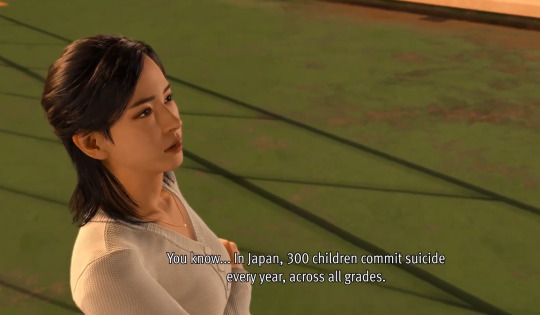
Sawa is in some ways, powerless and even lacking in conviction to act on what power she does have. Sawa has been a bystander for not one, but three cases of serious bullying, by the time the game starts (Mitsuru, Toshiro, Koda)-- and has never been able to follow through on speaking up for the victims. Speaking out against those who covered up their horrendous neglect (hello? What even happened to that horrible teacher who covered up Toshiro-kun's bullying??)
Yagami, on the other hand, handles Koda’s bullying case with uncanny grace for an outsider. Not only does he prevent the bullying and start to turn on the minds of the bullies, he does so by encouraging the other students to speak up.
This also provides the parallel that I’ve teased out in the earlier discussion of Kuwana and Kusumoto’s relationship: both Yagami and Kuwana provide tools that they previously lacked to deal with the bullying problem. Yagami, some preventative medicine that worked wonders. And Kuwana, well, the power of Incredible Violence, I guess. The fact that Kusumoto embraces Kuwana’s tools whole heartedly, and Sawa resists Yagami’s interventions despite seeing them work is, I think, another interesting contrast between Sawa and Kusumoto.
But to round it back to Yagami/Kuwana parallels and discussion, the contrast in the methods they both offer is, philosophically, is why I still align more so with Yagami than I do with Kuwana, even though I’m sympathetic to the realities the game is presenting: that the justice system failed the bullying victims. To focus on the prevention of further violence and injustice seems to me the kinder thing than to enact retribution in the shadows that’s so utterly violent that you believe it’ll prevent further violence (I don’t think this is true! I think Kuwana is very wrong about this! Punitive justice is not good!).
I’ll end this with a tantalizing question – what kind of paths could be explored if Sawa had not been killed by Soma? I think there could be some really interesting canon-divergence AUs there, and I’m not guaranteeing they’d be positive ones either. Without Sawa’s death giving Yagami more solid justification for staying strong, there’s a lot less he could do, persuasion-wise, and internally, to get people on his side. But by the same token, there seems to be less of an immediate impediment to Kuwana and Yagami being on opposite sides…opportunities for both redemption arcs and corruption arcs there.
Food for thought for ficcers ;) and feel free to run with this, if you like it. I’m a “many cakes for many concepts” fic enjoyer, so even if I did write such an AU, I’m sure it’d be particular and different.
And if you've read this all, thank you! Kuwana and Yagami are living in my brain rent-paying <3
#meta#kuwana jin#jin kuwana#takayuki yagami#yagami takayuki#kuwagami#(mentioned/relevant to the premise)#lost judgment#lost judgment spoilers#judge eyes#rgg
19 notes
·
View notes
Text
I am doing more research on religious archetypes and symbolism for my fucked up little trigun paper than I did in an entire year of theology classes in undergrad so uh
#also#trigun is mentioned in like maybe 3 academic articles I’ve found total#and none of it’s relevant to my work#so beloved people#more of us need to do academic research regarding trigun#“little” paper as if the minimum page count isn’t 15#I *do* feel slightly feral#and today I have to explain my premise to my class#so#me /visibly shaking/ yall wanna hear about Trigun#if I make an A on the paper I’ll post excerpts here on the hellsite#maybe#feverdreamsandlucidnightmares
5 notes
·
View notes
Text
'I'm in Love with the Villainess' Anime - Episode 1 Review
An astounding and hilarious first outing for the series with the power to revolutionize Yuri
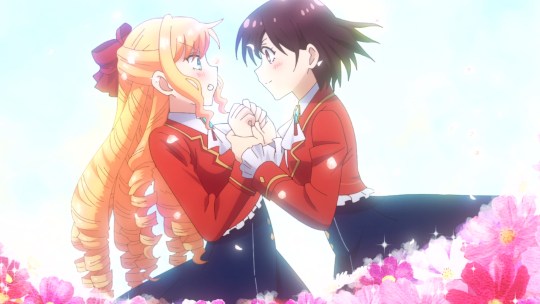
We are finally here, the long-awaited and much anticipated first episode of Platinum Vision’s I’m in Love with the Villainess anime aired on Tokyo MX and is streaming everywhere outside of Asia with a plethora of dubbing options, including English, on day one on Crunchyroll.
The first outing covers most of the events of the light novel’s first chapter, or the first three chapters of the manga, at a rapid but steady and not overwhelming pace. At this rate, the anime should be able to cover much of the series’ first arc, or the first two out of five books, in a single cour. Perhaps a bit less, depending on which of the story’s various adventures it elects to include. This is an exciting possibility, to be sure, as the story is a character-driven, socially mindful, and expertly written and, despite its fantasy setting, an exceptionally relevant tale of romance, socio-economic inequality, and of course, queerness.
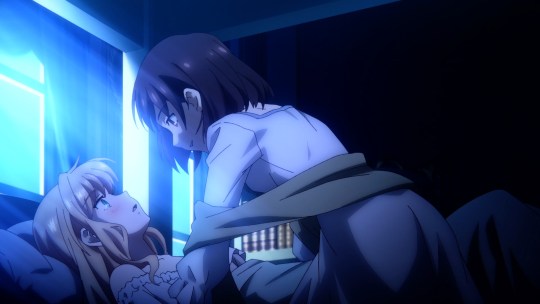
While the first arc of Villainess is a triumph, it would be a shame not to see at least some of the developments from the extra chapters that lead into the second story, like (spoilers for the end of volume 2) Rae and Claire’s wedding and their adopted twin daughters May and Aleah. If we are lucky, perhaps they will appear in the final episode or, dare to dream, a second season (end of spoilers).
Now, onto the show itself. For those who, for whatever reason, have not read Inori’s masterpiece, I’m in Love with the Villainess follows Rae Taylor. A salary worker who dies and is reincarnated as the protagonist of her favorite otome game, Revolution. However, Rae has no interest in any of the game world’s three eligible royal bachelors and has eyes only for the game villainess Claire François. Armed with exceptionally magical ability, Rae sets out determined to secure a happy ending for her beloved Claire against the coming revolution and perhaps win her heart in the process.
Now, the opening of I’m in Love with the Villainess is the series' weakest moment in all mediums, which, considering episode one’s outstanding quality, only highlights just how superb the Yuri masterpiece is as a whole. Even with its need to establish the setting, characters, and premise of the series, the premiere managed to be an excellent introduction and set the bar high with lots of laughs, entertainment, and service between our two leads.
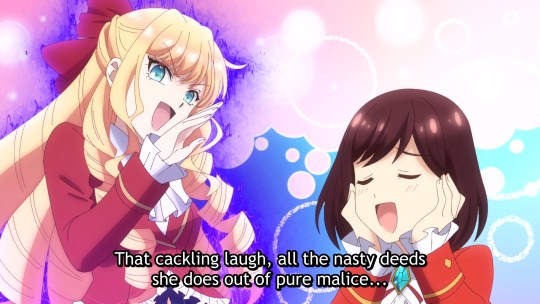
I watched the Japanese audio, and Yu Serizawa and Karin Nanami are fantastic in these roles, with Serizawa playing up Rae’s teasing adoration and borderline masochism at full blast, and Nanami explicitly giving voice to Claire’s arrogance and frustration. She even manages to deliver a perfect Ojou-style laugh to seal the character’s elite status and lean into the show’s use of otome tropes. And having the leads sing the excellent opening and ending themes is just icing on the cake.
Speaking of tropes, while Ironi’s original work is a genre-defying masterpiece that broke the Yuri mold, it is never afraid to play with the genre’s iconography and its otome game setting. Every other scene had another allusion, including to the book’s cover. As always, I am likely overeager to see connections, however intentional they may be, but the academy’s halls harken to otome staples, the bells and strings of the first scene's soundtrack conjured blistering memories of Strawberry Panic (perhaps a sacrilegious comparison to make but I digress), and even an areal shot of the campus was another check mark on my “Scenic Yuri” theory.
Now, as mentioned, I’m in Love with the Villainess has to establish the groundwork here, and narratively, these are the weakest moments, often direct exposition, with a few exceptions like Rae’s conversation with her roommate Mash about maintaining Claire’s attention. The narration is at least accompanied by relevant and creative, if perhaps limited, animation. But to their credit, these moments are succinct, existing only as long as they have to in order to provide the necessary information and get out of the way for what matters most: the characters.
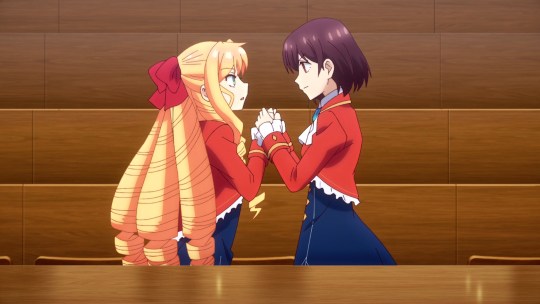
Rae and Claire are front and center from the very get-go, and there is little time wasted in showcasing Rae’s intense bottom energy or establishing Claire’s elitism and bewildered anger towards Rae’s excitement in the face of Claire’s carefully calculated cruelty. It is a montage of silly and fun competitions between the two that had me laughing and smiling all the way through, as the Yuri was present in full force, and gives glimpses at the mutual obsession the women have for each other that will soon blossom into a wonderful romance.
These early story beats have a light tone and focus on the bullying, teasing, and rivalry between Rae and Claire, a dynamic that previously and understandably made a subset of readers somewhat uncomfortable. However, assuming the anime unfolds in a similar manner to the manga and light novels, the narrative will explore meatier, heavier subject matter and a far deeper lesbian romance, all without losing its sense of fun and adventure. The next episode or two will be incredibly telling - as the source material is perhaps the most profound and forthright depictions of LGBTQ identity in Yuri, and that all starts with a pivotal conversation that, if it is included, will be coming up shortly.
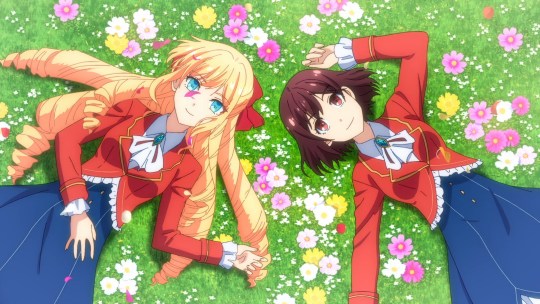
Overall, I am incredibly excited for this series. The first episode is everything I had hoped for out of an adaptation of one of my favorite works of all time, save the animation, which is average at best. While there is a lot more to see, and we will have to wait to know if I’m in Love with the Villainess lives up to its incredible potential and source material, I am extremely hopeful. We have one of the funniest, most thoughtful, and queerest works of Yuri transformed into a stunning anime project unlike anything that has come before and offers the chance at not just a new Yuri “gateway” but to continue the work of its source material in revolutionizing the genre.
Ratings:
Story – 8
Characters – 10
Art – 5
LGBTQ – We shall see…
Sexual Content – 3
Final – 8
I'm in Love with the Villainess is streaming on Crunchyroll with English sub/dub.
Review made possible by Avery Riehl and the rest of the YuriMother Patrons. Support YuriMother on Patreon for early access, exclusive article, and more: patreon.com/yurimother
#yuri#Reviews#girls love#lgbt#anime#i'm in love with the villainess#ILTV#lgbtq#gay#gl#queer#lesbian#manga#yuri anime#gl anime
621 notes
·
View notes
Text
S5 finale: wrapping up the "running out of time" theme
So I have been mentioning frequently that there is a theme of "running out of time" in season 5, but I wasn't able to make out the meaning of it, until now.
We can say that there are three situations where the theme explicitely manifests:
Gabriel: After receiving a cataclysm wound in Destruction, we often hear Gabriel repeat that he is running out of time. The entire Intuition episode is based on that premise.
Ladynoir: This is the most obvious manifestation of this theme. In Jubilation, Ladybug and Chat Noir live a dream just to be constantly reminded that their perfect life together will end when they wake up to reality. I call it Ladynoir, but actually it is Maribug's love and romantic relationship with Chat in general.
Adrinette: This is the most subtle one, but it is there. Notice how Marinette needs to ease into a relationship with Adrien, and Adrien is doing his best to cut her slack, so much so that he says in Derision, and I quote: "We've got time." Soon after, Adrien is sent to London.
If you think I have forgotten other strings of running out of time, feel free to let me know!
Now let's look at these three strings individually:
Gabriel running out of time
This one is the simplest one as it starts very early on in the season, with the episode Destruction where he gets the cataclym wound, and ends in Recreation with his "sacrifice." Also worthy noting the names of the episodes. What starts as Gabriel running out of time in Destruction is concluded in Recreation with him making his wish, accomplishing his wish, and dying. We can consider this thread concluded.
2. Ladynoir running out of time
Of course, the first episode that comes to mind is Jubilation. In Jubilation we (and the blorbos) learn that they actually desire to be together, romantically. And indeed they get to live a perfect little life in their dream, ignoring the increasingly bigger alarm clocks that are trying to wake them up. Except that at the end Ladybug realises that they must wake up (duty calls!), and she abandons Chat Noir in the dream universe, broken.
From here on, nearly every episode is a warning for Marinette against being romantically together with Chat Noir:
Determination: Marinette accepts that she has feelings for Chat Noir, her reaction to that is crying
Passion: Ladybug's crush on Chat Noir leads to her being distracted and making many critical mistakes in their fight
Reunion: is a cautionary tale about Ladybug and Cat Miraculous holders falling in love
Illusion: (I haven't watched this in a while but I think nothing relevant happens here)
Elation: Marinette is nearly akumatised because of her love to and rejection by Chat Noir
The overarching message from Jubilation to Elation is that: if Maribug ends up with Chat Noir, it'll be a disaster.
So Marinette decides to close up her heart to anyone, and after a brief depression, Adrien finally convinces her to be with him and they become an official couple. From this point onwards, the key ship becomes Adrinette.
Does that mean that Ladynoir has run out of time? Not necessarily. They just decided to love each other in a different way. I should remind here that even though we tend to polarise the sides of the square as fandom, the creators have repeatedly told that the love square is one, there is one love.
The Ladynoir relationship has a direct connection to the Adrinette dynamics because after all, they're the same two people.
3. Adrinette running out of time
Now that Adrinette is finally together, they should have all the time in the world, right? Right? It's what Adrien says, after all.
But I couldn't shake this sense of urgency throughout this season. Every time they said that they had time, it made me feel like they actually don't and they don't know it. And it was exactly what they wanted to make us feel: with Adrien's move to London, it turns out they didn't have time. Worse is that, Adrien actually knew that he'd need to move to London but he couldn't tell it to Marinette, he kept it a secret all the way till he was shipped off to London.
And there is a parallel between Jubilation and Revolution here: in both episodes, their dream is shattered, they share one last dramatic kiss, and they are torn apart from one and other (@asukiess had a big brain time and pointed this out back when Revolution aired).
But now, in Recreation, Gabriel is gone. Everything is fixed? Everyone will be happy, right?
Well... No.
As I pointed out in a previous post, the world that Gabriel creates is a bit too bright, too perfect. The show is notorious for associating the sun with fake happiness at this point, while the "real" moments are rainy and/or dark. And let's see the colour palette in the end:

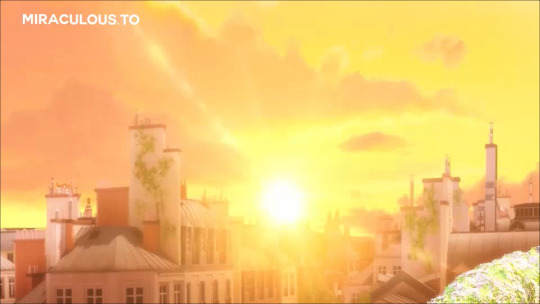
Another detail that makes me put on my tinfoil hat:
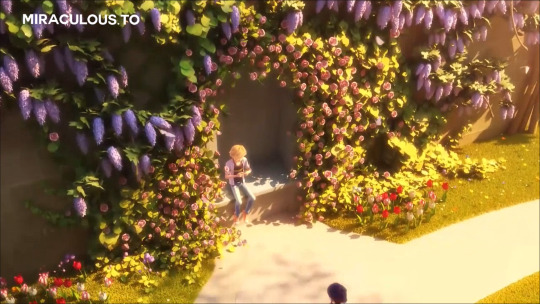
They're not very visible on the static image, but there are white butterflies flying over the flower arch. Those could be symbolising the end, as a reference to how Ladybug releases the purified akuma at the end of each episode. But it might also have a second meaning, a reference to how this world was in fact created upon the ideals of Gabriel.
And that can't be good for anyone. I explain more the consequences and aftermath of this episode in the post I mention above, but basically this world is Gabriel's ideal, and it is far from being a good place for neither Marinette, nor Adrien.
One main reason why: Gabriel has left Marinette with the truth about the Monarch, and she agreed to keep it a secret from Adrien. But we know that it will eventually come out. Either she tells it to Chat Noir, or maybe Lila plots something, but it won't remain a secret forever. And when it does... it will have tremendous impact on not only Adrinette, but also Ladynoir.
This world is a fantasy world where Marinette and Adrien have ended up together, just like in: Chat Blanc, Ephemeral, Oblivio, Jubilation. And at one point the alarm clock will ring, the hammer will drop, and both Ladynoir and Adrinette will run out of time. Except that this time, we may not be able to revert back to the status quo.
Gabriel has left them with a tickling time bomb.
#miraculous ladybug#ml spoilers#ml season 5#from fortuna#ml analysis#ml speculation#ml recreation#ml jubilation#ladynoir#adrinette
552 notes
·
View notes
Text
Digging Graves for your Morals; Or, The Ethical Problem of Outlawry
Hello, yes, I am here again. This one is shorter, I swear (it’s under four thousand words, even). If this is the first post from me you’re seeing, this is a follow-up to my prior essay posted here on the game The Coffin of Andy and Leyley, although it should be able to mostly stand alone.
At the end of my last essay, I touched on both the game’s nearly uncompromising moral scepticism and relativity, but I didn’t really dig into it. I outlined that the game only textually frames actions as ‘morally bad’ in the context of a morality set by the society and the world that has treated them as no better than farm animals raised for the slaughter. Well, I have a lot to say on the topic of ethics on the topic of The Coffin of Andy and Leyley, so buckle in, this one’s going to talk about the social contract, moral scepticism and everyone’s favourite topic: Mrs. Graves.
As usual, this was originally posted and formatted for on Sufficient Velocity and you can perhaps more easily read it there. Spoilers abound, and my content warning from last time still applies.
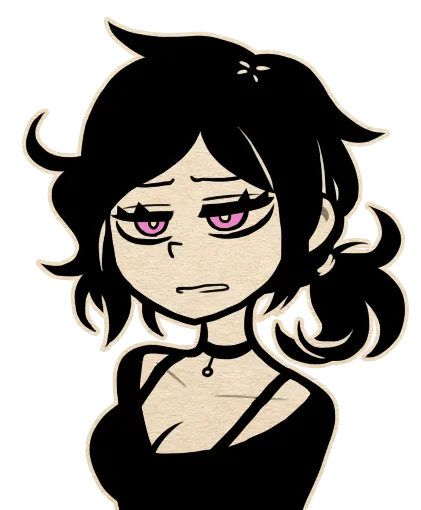
She’s not too hot on either ethics or her mother
The Meat of the Matter
Since a lot of this is optional or otherwise missable information, let’s review the premise the game gives us. If you’re already aware of all of this, I apologise, it won’t take long.
First off the bat, the quarantine at the start of the game was a hoax-driven money-making scheme of which you can pick up more-or-less all the relevant details of. This is entirely missable and by the time it’s possible to discover, our protagonists have better things to dwell on and have dialogue about, so I’ll give you a summary of what you can deduce from reading the notes and thinking about it.
The quarantine is an organ harvesting operation, as per some documents you can discover in the wardens’ office. They entrap the residents, test their blood types and starve to death those they deem surplus to requirements — alternatively the starvation itself could be their method of ‘preparing the harvest’, there’s evidence in both directions and it hardly matters — harvesting the organs of the others for sale. As our protagonists are AB-typed, the ‘universal recipient’ or ‘most selfish blood type’, they’re some of the first on the chopping block.
If you read through the newspapers and the documents in Mr. Washing Machine’s car, you can discover that ultimately ToxiSoda are responsible, and a similar thing is happening in a different city under the guise of a ‘chemical leak’. Should you further investigate matters, you will find mentions of the ‘man behind it all’, the doctor, or the Surgeon, as the fandom have been referring to him — you may recall Mrs. Graves mentioned someone similar! Yeah, he’s the guy who runs ToxiSoda, who are themselves partners with the water company that faked the parasite outbreak in the first place.
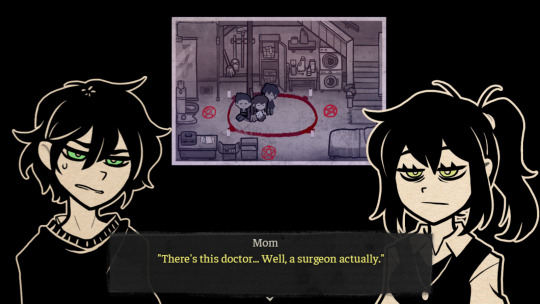
It’s all a life insurance scam, apparently
How much the details of the operation matter is something open to interpretation — it might just be something for players to figure out and Episode 3 will not cover the Surgeon at all, or he might play a major part; it's not particularly relevant to this essay. What matters is that it happened at all — indeed, it’s fairly easy to justify Ashley and Andrew in everything they did in Episode 1 (flashbacks aside), arguing that if they’d made any other decisions they’d have died — an argument that the victims dug their own graves, even if the Graves siblings put them in them. How correct that is is a matter of debate, but that you can make the argument at all matters, and we’ll be returning to this later. In my last essay (and again in the introduction here), I made an analogy to farm animals, raised without love and for slaughter. Let’s put a pin in the ‘for slaughter’ part for now and take a look at the ‘without love’ part.
That’s right, it’s time to meet the parents.
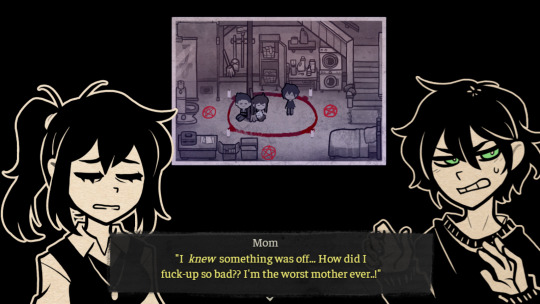
As Andrew notes, there are significantly more compelling reasons for you to say that
They Fuck You Up, Your Mum & Dad
They really do.
Our charming protagonists are, as with many things depicted in this game, an exaggerated, almost farcical example of this phenomenon — one that’s just grounded enough to still feel very real, just like the siblings themselves.
The late and lamentable Mrs. Graves is just the same: originally a teen mother, hopelessly out of depth with two difficult children — even if one was good at masking it — and an unreliable, emotionally unavailable (at least to their children) partner who can’t hold down a job, ends up foisting them off on each other and doing a Parental Negligence because she simply Cannot Cope. That’s the real part. The part where she gets paid off by an organ harvesting operation to leave them to die, that’s the borderline-farcical exaggeration that throws all the nooks and crannies of her character into sharp relief.
Mrs. Graves does not have a good relationship with either of her kids. Having self-admittedly fobbed the job of raising Ashley off on her son, to the degree that they did not even celebrate her birthday as kids, both of them hold differing degrees and types of resentment for her.
For Ashley, it’s hate — perhaps not quite so clear cut as that, as it’s her that calls for the eulogy and she shows some potential signs of discomfort while cleaning up her parents’ corpses, but by and large, it’s fairly simple and straightforward, as usual for Ashley. The sentiment is not exactly unreturned, either.
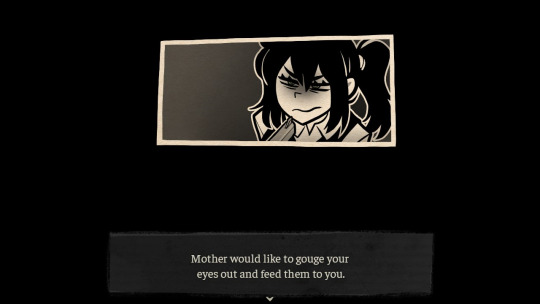
This brings Ashley’s heart great delight!
The most clear incident raising her from everyday ‘neglectful’ to ‘wow she wanted nothing to do with this kid’ is the optional ‘birthday cake’ scene, obtained by finding the present in Ashley’s first ‘transitory world’ dream, in which we see Ashley’s birthday and the founding of a lemon cupcake tradition between Leyley and Andy. She has received nothing from her family, notes that her ‘friends’ would say they were busy before she even told them the schedule and Andy takes her out to buy cupcakes with his pocket money.
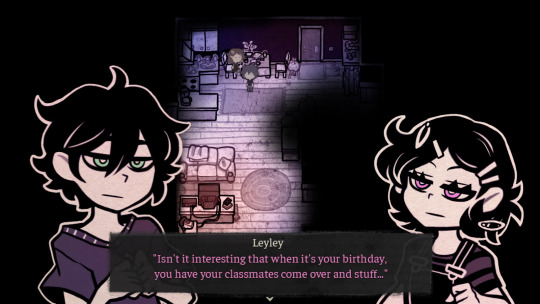
This scene gets a callback in Andrew’s dream later. Just remember to Ask Nicely, rather than Kill Her.
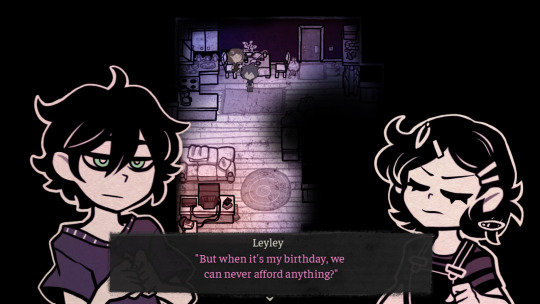
Parents of the year, everyone.
So with Ashley it’s as straightforward and obvious as she herself is — she hates her mother, her mother hates her. With Andrew, as with Andrew himself, it’s a fair bit more complicated. His mother is a much more nuanced figure, who is believable in her role as an unfortunate teen parent who was trying her best. He has a degree of trust in her against, seemingly, his own good judgment In her conversation with Andrew, she acknowledges her fault in raising him and seemingly sincerely tries to offer him a ‘way out’, an olive branch.
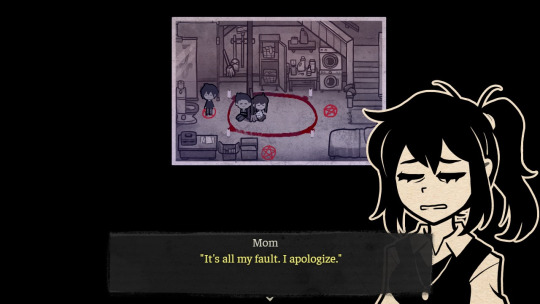
I think many people have had relationships where they might say this
This scene in particular intrigues me, because she is acknowledging fault in a way that Andrew strictly avoids doing — and well, there’s nothing Andrew likes more than a good way to avoid acknowledging any fault of his own. With her dominant relationship over their father as a model for Andrew to draw comparisons to his own relationship with Ashley with, it’s no surprise that the narrative resonates with him to the point of ‘Accept’ being many people’s first completion.
Of course, that’s not all there is to it. There is a fascinating contrast with her later conversation with Ashley, where she — despite accusing Ashley of brainwashing Andrew — refers to Leyley and Andy as ‘two psychos’ and states that she always knew they were responsible for Nina’s death and that, implicitly, they owe her for not turning them in.

There's something about mother-daughter relationships here that I just do not have the time or reading to dig into, unfortunately.
Meanwhile, when Andrew interrogates her on her possession of their death certificates, she has… an interesting, plausible story about a life insurance scam and claims that she really did think they died in the fire, implicitly denying the claim that she sold them. It’s entirely possible that she’s describing the details of the ‘scam’ correctly — you can even buy that she genuinely does care for Andrew in some way, if not Ashley, but her claim about being an honest, grieving parent shocked at their deaths… doesn’t add up?
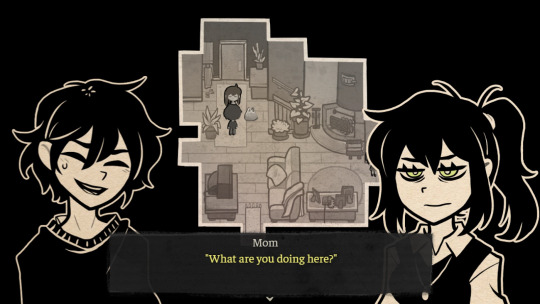
This is a very normal reaction to your supposedly dead children showing up in your house.
As Andrew himself notes after hearing her story, she’s full of shit. This gets into speculation, because there are a few ways to read this, but the most plausible ‘gist’ is that she and her partner were paid off in money and jobs to not raise a fuss — the surgeon she mentioned is almost certainly the founder of ToxiSoda, remember?
The overwhelming difference in presentation between how she speaks to Andrew and Ashley invites investigation — and when Andrew turns down her offer and tells her he isn’t interested in her offer in Decline, her reaction isn’t… despair, it’s shock — and well, there’s a good reason for that.
Why do you think she did it in the first place?
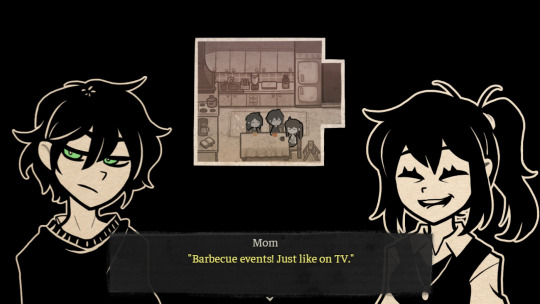
This is the happiest we see her
Well — it’s so she can finally fit into society. That white picket fence, that idyllic 1950s life — hell you can call it the American Dream. She wants that, or as close to it as she can get — the working-class teen mother, living in poverty, aspiring to the middle-class. It’s a very common, very real and very grounded motivation.
And to that end, she effectively sold off her children. It’s no wonder she can’t fathom why Andrew wouldn’t choose the same.
That’s the part that makes you think — just like the deaths in Episode 1, well- maybe the siblings are justified here, too. It’s a weaker argument, but it’s still one you can make under many common moral paradigms today — what goes around comes around, all that jazz. Just look at how awful she was to Ashley.

She’s finally found what she’s been striving for.
Here’s the thing, here’s the thing though — what, reasonably, could she have done? Andrew and Ashley briefly highlight this in conversation about Ashley’s ‘friends’ in Episode 1 — was she supposed to fight gunmen to try and break them out? Throw food to the balcony from four stories?
Moreover, as she herself says to Andrew… would anyone really have been able to do better than her in her position? She was seventeen when Ashley was born, living in poverty with a partner who couldn’t even remember Andrew’s name when he was a kid. Anyone would have had difficulty, let alone with these kids.
Her evils are — they’re not any deliberate action, but rather… prompted inaction. She didn’t have the emotional energy, resources or plain capability to properly parent her children, she didn’t have any solutions to their murder of Nina in a state so blatantly hostile to its underclass, she didn’t have a way to connect with Ashley and she took the money rather than fight a futile and likely suicidal battle against a corporation and its armed goons in a dystopian setting.
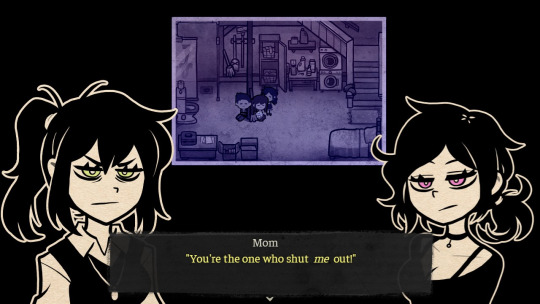
Ashley, notably, does not deny this.
Her sin is the one we’re all, I think, guilty of — that of not trying hard enough, that of inaction in the face of difficult tasks, of not standing up on principle because it’s just too much that day and you don’t have the spoons, you’ll do it tomorrow (no you won’t). It’s a petty, everyday kind of evil — that of not doing enough.
Is that enough to condemn her? Certainly, there’s a pretty manipulative read of her that likely has some truth to it — in the locked door in Ashley’s dream in ‘Decay’ you can discover that she has a ‘not-hatched’ tar soul — but consider that lens — the game won’t make up your mind for you, so you’ll need to choose that for yourself.

The dad is interesting in terms of negative space — but he’s mostly important in that he doesn’t matter, so I decided to not fit him in here. He has art, though — just no sprite, because, well, he’s never mattered to either sibling.
The Contract We Call Society
Right, it’s time to get a little bit Theoretical in here. Not much, but a little. Social contract theory is a complex topic with a lot of nuance, much of which I will be eliding in the name of not writing a twenty thousand word paper on semiotics, law, and anthropology, but the short analogy is… the idea that as long as you play by society’s rules, as long as you are a good citizen, a good person, the state, or the community, will take care of you.
In a number of ways, the harshest penalty levied by many historical states and legal codes was not death, but rather the criminal status of outlawry, a practice that’s cropped up a number of times in history — the practice of no longer being protected by the law. This meant one could be killed or worse with impunity — you were no longer protected by mob justice and, while overexaggerated as a term of reference, certain texts from Medieval England refer to outlaws as bearing a wolfshead, ‘for the wolf is a beast hated by all folk’. Never minding that wolves are actually delightful, this was a time when wolves were actively hunted and sold by people — and the same was intended to happen to outlaws. They were ‘fair targets’ as far as society was concerned, no longer to be treated as your fellow citizens.
This was the gravest punishment on the books, for most of these legal codes — something saved for those who had broken the social contract so completely that there could be no turning back (civil outlawry is… a bit different, that’s not the topic here). Among others, a modern critique of the concept is that it offers no incentive for improvement, no incentive to change or to cease harming society — if an outlaw has none of the social contract’s protections, what reason do they have to obey… any of the social contract? If that seems familiar, well, let me ask you this:
What if the state or community fails its end first? What responsibility does the innocent outlaw have to that contract?
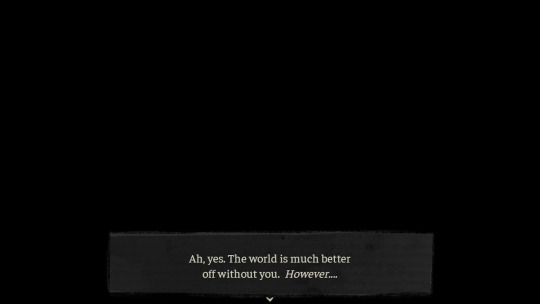
It’s an interesting phrasing, that the world is better off.
It’s time to talk about the incest, and part of why it’s there. The cannibalism too, but that’s less impactful here. If you’ve seen me elsewhere, you might have seen me say that the incest is a load-bearing narrative pillar — in large part due to it being a critical facet of the siblings’ relationship, but in another large part due to it being an equally critical part of how the game uses taboo.
A taboo is in this context something that is considered repulsive and to be avoided by society. It’s a more complex term than that — you can also use it for certain sacred actions or utterances that are only permitted to certain people, for example — but that’s what it is here. Swearing, premarital sex, BDSM and murder are, approximately from weak to strong, some example taboos held in modern Anglospheric society.
Strong taboos are a staple of horror — they shock, they disgust, they draw people’s attention and it’s that last one that’s critical here. Incest is a very strong taboo — while I am absolutely not segueing into its historical context, the very well-established Westermarck effect gives it a certain timelessness and immunity to desensitisation that most other taboos don’t have — murder, to contrast, is a taboo we’re largely desensitised to in modern media and works of modern media have to put in actual work to make a murder seem horrifying — through atmosphere, cinematography, evocative prose etc.
And this is important because the use of taboo I’m covering in this essay is that the incest is used to invite judgment — it is so ingrained as a ‘wrong thing’ in people’s brains almost regardless of background that it forces the player to engage with the work morally. And that’s where the fun starts.
I’ve mentioned before, very briefly, about the juxtaposition of tone between the Burial & Decay endings, contrasting with the very monstrous difference in morality. Burial is remarkably light-hearted — they play around with the drain blockage, they joke about their mother’s personality and this is further exaggerated on the Love path, where Andrew is much more comfortable with casual contact and the two make a game out of how far they can throw their parents’ skulls, the humour is directly contrasted against their abhorrent actions.

I’ll be real Ashley is far more merciful than I, I’m shuddering at the thought of that gunk in my hair
In comparison, Decay is… bleak. I’ve seen it being referred to as being ‘emotionally sandblasted’ and, yeah I think that’s fair — it’s uncomfortable, it’s heavy and it’s just not fun. And this is the route in which, if you chose Trust into Accept, Andrew has bought into the narrative that his mother’s offered — that he can fit just fine into society if he wasn’t stuck, if not for Ashley — the route that ‘fits’ most closely to the social contract, to Andrew feeling the guilt that we think he should and hating the monsters that they’ve become, as the social contract deems them. Given the pains the game takes to attach the player to the protagonists, this normative moral ending is very easily interpreted as the bad ending.
And well, isn’t it?
Thing is, as mentioned above, the social contract has never held up its end for them. The game takes careful pains to point out to a viewer that they’ve never had the life that society promises people, so why do its moral standards apply?
The game invites you to judge the characters, and in the same motion, asks you from what principles you judge them, making a pretty good guess in that, like most people who haven’t spent a large amount of time navel-gazing and reading some very boring books by very dusty old men, they come from the society around you.
Love even has Ashley express this sentiment directly after the incestuous dream — she asks you — well, Andrew, but this is also something for the player to mull over — why this is what’s engaged your morality or sense of revulsion, rather than the desecration, cannibalism or murder.
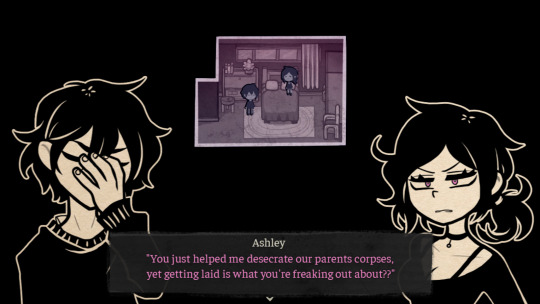
Andrew and Ashley are both very funny and very fascinating in this scene.
And that’s the framing that it casts all of its own moral judgement in — even the ‘tar-soul’ aspect is… well, it’s unclear what it even means. Mrs. Graves was a ‘not-hatched’ tar soul, after all. Other than that, it’s society and the world being better off without them, rather than any kind of assertion of objective morality. Due to the present of ‘soul colour’, we’ll presumably see the game make some moral statements in Episode 3, but as it stands?
It’s nearly completely morally sceptical, in and of itself — it’s not interested in moral assertions or education, it’s interested in making you question your own morals. Deconstructive (not that kind), rather than dialectic, to be mildly pretentious.
It uses taboo and shock to invite moral judgement, but then uses tone, charm and our instinct to look for the happiest end for our blorbos to get you to recognise that these are principles you yourself brought into the game, rather than any it’s handed you.
To summarise: you’ve brought these principles in from society, but what do the siblings, the protagonists, the villains to the world, owe society? Enough that they should follow them? It failed them first, after all.
Closing Thoughts
This one is a bit less energetic than the last, tragically — my sleeping schedule is the stuff of nightmares recently, I love windy weather. Wait, no the opposite. Huge thank you to everyone who commented on the last one, you are the wind beneath my wings and the main reason I managed to get this out this week.
This essay is a bit more interpretative than my last one — certainly, there are alternative readings and I’ve been toying with the idea of deliberately taking a reading I don’t like very much and writing from that perspective as a demonstrative exercise recently — mostly that you shouldn’t just take my word for things!
Otherwise, if the last bit at the end seemed murky, I apologise — I did try to write a more detailed version, but firstly, it was three thousand words and secondly, I re-read it the next day and I could not understand what the fuck I was talking about. Personally, I blame Derrida — suffice to say that I strongly recommend playing through it with an eye towards considering culpability, morality and why you think certain characters are more or less forgivable than others, and for what deeds. See what you get out of it.
I managed to keep one particular thread open to wrap up with here — I try to keep speculation on Episode 3 content to a minimum in the main essays, but it should be fine here — you might have noticed that I refer to Episode 1 and Episode 2 being on something of a spectrum of justifiability, with the siblings’ actions being ‘more’ justifiable in Episode 1 and ‘less’ justifiable — but still justifiable if you try — in Episode 2.
To continue the thought of the happiest ending being the one in which they step the furthest away from common morality and to further jar the viewers’ sense of morality by contrasting societal morality and blorbo-oriented morality, Episode 3: Burial could continue this trend in having a major victim be someone who, well, has done nothing wrong and isn’t even guilty of bystander syndrome.
I wonder if there’s any good candidates, someone who’s sweet, harmless and will indisputably be an innocent victim…
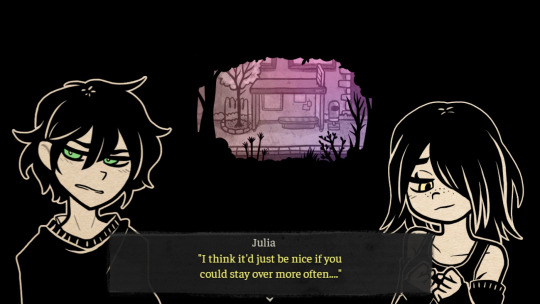
…I’m sure she’ll be fine
#the coffin of andy and leyley#tcoaal#analysis#essay#ashley graves#andrew graves#mrs graves#nnnnot sure what the next topic will be#might do a deranged take on purpose#this one and the last one have been very grounded#I'll get to my asks tomorrow#probably#I've been busy sorry
376 notes
·
View notes
Text
I've been thinking about how things would be in Panem after the revolution. But I mean like 30 years or so in the future, when there's a new generation of children that have been born and raised without the existence of the games. I think about how the themes of memory and rebuilding would unfold. How would the relationship between the districts and the Capitol evolve? And the relationship between the districts? How would they organize themselves? What about the tension between people from the Capitol and people of the districts? And that's without mentioning what would have been of Katniss' and Peeta's lives, and all of the other characters of the series. How would their kids react after learning about everything they had to go through? What would their world view be like? I guess we'll never know. But lately I've been unable to stop thinking about it.
I read somewhere that Suzanne Collins said she only writes when she has something to say. And I mean, we used to think she wouldn't write another book after the trilogy ended, but then the ballad came out and (at least in my opinion) it was a great adition to the universe. Not only it added plenty of layers to the original story, it also introduced new themes and concepts to explore which are just as relevant as the original's were at the time.
What I'm trying to get at is that if she were to write a new book (or series) related to this universe, I think it would be interesting to see the future. I know some people want to know more about Finnick's or Haymitch's games, but there's always fanfiction and fanmade content that can explore those in deep. I'm aware of the discourse regarding this topic, and I agree that the games for the sake of the games (as merely enternainment) goes against the premise of the series. I won't dwell on that because it's been explained before, but I did mention it for a reason: would people be interested in a new story set in a future without any games? One about the rebuilding of a nation, the small steps towards a presumable better world and the awareness of the mistakes of the past?
I don't know, I got caught up in that idea and I wanted to get it out of my mind. I mean, we do get a little hint when Plutarch mentions how stupid humans are and how quickly we forget, at the end of Mockingjay. And then, if a story like that was written, what would be the culmination? Certainly not a utopia, but that's what life's about, right? Constantly trying to do better than yesterday, or at least not as bad? Maybe? Hopefuly?
Anyway, I just needed to rant for a bit.
#the hunger games#thg#thg series#suzanne collins#hunger games#katniss everdeen#katniss and peeta#peeta mellark#the mockingjay#the ballad of songbirds and snakes#lucy gray baird#coriolanus snow#finnick odair#haymitch abernathy#panem#jennifer lawrence#josh hutcherson
86 notes
·
View notes
Text
Opening a thread to talk about what we'll see in the second season of the animated adaptation of “Spy x Family” about Twiyor, Loid and Yor‼️🕵️♂️🌹
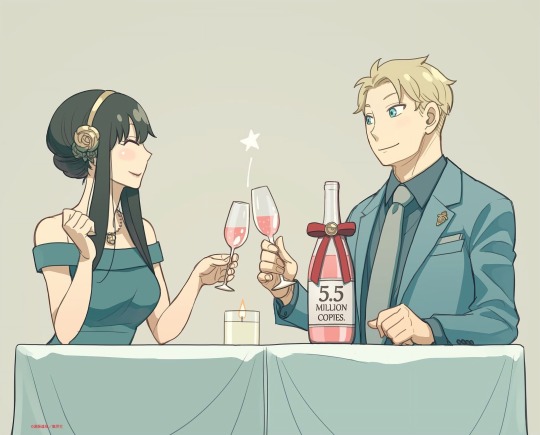
Before going into details, let's contextualize a bit.
The second season was announced in December, and a teaser was released at the end of the first season. Although its length was not specified, it made it clear that it would cover what is known as the TwiYor Date & Cruise arc.
As of the date of creation of this thread, we haven't received much more information. In May, a couple of posters were released, but that's about it. However, that doesn't stop us from keeping an optimistic attitude.
That said, let's go explore what this second season has in store for us!
TwiYor Date/Twiyor bull-shot date or Misión Extra 2
The first thing we will see is one of the most loved and appreciated chapters within the fandom. It is a chapter that was expected to be adapted in the first season, but it could not be and was left for the second in this chapter, we see that Yor takes a bullet in the butt and due to her annoyed expression, Loid decides to take her on a date. With this premise, a series of events and a rather charming moment between Loid and Yor unfolds.
Chapter 40.
Although perhaps considered a transitional chapter and not very relevant, it presents a couple of curious aspects. Although they are immersed in a comic situation, Bond actually contributes a lot to the development of Loid's character, especially because of something that will happen later.
Chapter 43.
A chapter that begins with an informative introduction and then develops into a comic situation thanks to Franky and his attempt to win over a girl by retrieving a cat with Yor's involvement, we could consider it a subplot, but it actually lays the groundwork for what would become a full arc.
Cruise arc.
This I believe is the highlight of the second season. It is the first extended arc found in the manga and contains what are considered some highlights. Talking about this arc in relation to each character, especially Yor, would require a separate thread that I could do 👀
A highlight is that this is the first time the family is separated and away from their routine of work, secret missions and Eden. This situation intensifies their feeling of missing each other, which makes for some very tender moments and contributes to the development of each of them.
Special mention to the conclusion: chapter 56. It's another chapter that is beloved by the fandom and encapsulates the heart of the Forger family dynamic ❤️
Chapter 58
This occurs after the closing of the cruise arc. This is a rather extensive chapter starring Loid and Bond where, as mentioned in chapter 40, we can appreciate more sincere moments from Loid both emotionally and in his words. Importantly, the speech includes one of the most touching moments we have had so far from the spy.
For now, that's all. I know that there is a moment missing that is transcendental for Twilight's character; however, we don't know how much it will occupy in the second season nor its duration.
Therefore, I close this commentary based on what I believe will be primarily the plot of the second season.
If anything else needs to be added, I'll be on the lookout to do so!
If you made it to the end, thanks for reading this thread. It would be helpful if you could spread it around or comment to let me know what you think! ❤️

183 notes
·
View notes
Text
Nuclear hot take on a possible motive for the Lund sisters. We know what they did (erase themselves from history) and we know they wanted to do it (they knew where they'd end up and were looking forward for Zigi to join them there eventually), but why?
It starts from the infamous "Luiga says that he and Kurvitz say that a certain forum post is is correct in positing that Dora is, somehow and to some degree, actually Dolores Dei herself". Specifically, the post says that there was a human Dora who was overtaken by something like an archetype and lost herself into being Dolores Dei.
As a secondary premise, it is possible that Noid was literally right when he suspected Dolores Dei in particular of being somehow not entirely human, an immortal of some kind: in the final dream, she mentions the something or something else of immortality, crown scepter and thingamajig that were "passed onto her by the rulers of late antiquity". She just might have already been around in Perikarnassis' time, before the isolas split. Like, separate from the Dora thing, the game tells us that Dolores Dei was chummy with the rulers of late antiquity, a good few thousand years before her historical relevance.
My impression is that this same... potential for being Dolores Dei... ...somehow... is shared by the Lund girls. Source:
similar if not outright same surname (after all, Jean lampshades twice that he's not sure about Ingerlund being Dora's surname, in a way that may hint at some upcoming twist),
the whole peaches of immortality detour (I'll leave the specifics to Estonian speakers but I'm told it's functionally the same as Dora's apricots, to the point that an older pdf had a stray "apricot" instead of peach)
and, most importantly, Zigi's omen of destruction as he meets Charlotte. She's flat out described as having footsteps that spelled the destruction of Iilmaraa, which just so happens to be where Perikarnassis was, bundled with its rulers of late antiquity (I can do the geographical conspiracy board on a separate post if anyone's interested).
I think that Dora meeting Harry and Charlotte meeting Zigi is the beginning of the same story, one that may have been repeating since antiquity if we take this literally as well. Harry and Zigi, too, famously share an archetype of sorts, by virtue of being overt, straightforward Kurvitz expys. We even have the same emphasis on their cool leather jackets. For the middle class girls, this contact outside their gilded world sparks change. But here is where their stories diverge: Dora eventually rejects this change and falls into the comfort of being bourgeoisie incarnate. The Lund sisters, on the other hand, emphatically go "fuck all y'all" and choose to annihilate themselves.
Sooo, based on these totally solid premises that aren't a stretch in any way whatsoever (source: my beautiful mind, also it was revealed to me in a dream, and also fayde dot co dot uk), here's the take:
By virtue of this parallel between them and Dora, I think it's... not completely impossible... that it was precisely this aspect of themselves that they tried to annihilate, maybe subconsciously. A potential they felt was so wrong that they tried to erase it from history entirely, just walking into the pale wouldn't have been enough, it needed to be scrubbed at its root.
#If I had to type all this on a rickety phone for a reddit convo you people get to suffer through it too#mine#dolores dei#lund sisters#PJÕL#separate post incoming for the jackets thing because ough.#disco elysium#püha ja õudne lõhn#sacred and terrible air
117 notes
·
View notes
Note
I'd love to hear your hashtag wha critical thoughts about recent developments if you feel like sharing them :)
I'll preface this with saying that for this answer I will not be making a distinction between my personal tastes and what is "objectively worst". The TLDR is I have felt like WHA's been dipping in quality since book 8 approximately.
One of WHA's strong points is its ongoing theme of accessibility, via its premise of how magic is purposefully restricted from people, and via its characters, mostly the kids, who showcase various life issues and allow the story to talk about how to solve them. Disability is an important one and was at the center of book 8, which is one of my favorites. You get to see Tartah and Coco work together for a goal (=making their friend a better mobility aid), and by doing so they brainstorm the why and then how which allows for complex notions to be carried out and explained to the reader. Cute story with touching implications that flows well. This quote in particular sums up so well what WHA is "about"
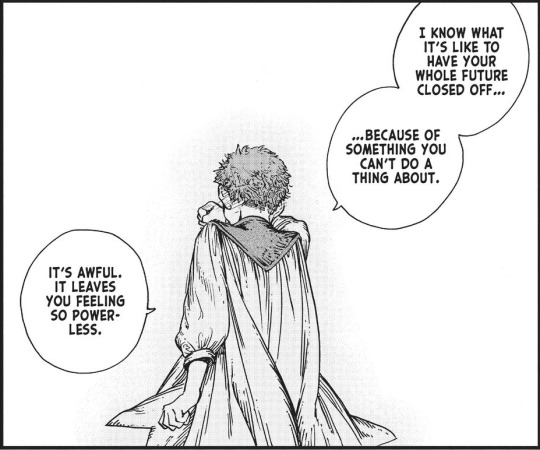
After this we transition rather brutally to the latest ongoing arc of the Silver Eve. This arc has been ongoing for years now, and three volumes, making it the longest so far, I'll come back to that, putting a star on it [*]. It delves further into aspects of accessibility the series had talked about before - access to magic, access to healthcare, and poverty. This is where this blog's namesake gets relevant. Custas is a kid who was already poor, who got badly wounded ending up disabled, and who because of that was stuck in a situation with no good endings: he can't make money in his state and needs money to get out of his state. On top of this gets added magic, and comes back the question at the center of WHA: Is it wrong to restrict the use of magic, and how?
After the arc is kickstarted by Custas getting his share of spilled beans of magical secrets revealed, enter immediatly strong players via ch.48's introduction of the Wise Ones and the king himself. The political aspect of how the world works was not mentioned before. Great chapter, interesting stuff all around, personally answered much of my questions. Immediatly after this chapter the focus in 49 fully switches to the Knights and their job, and the rest of the chapter is dedicated to a story of a sexual assault survivor and how she made it. It's a surprising topic to see pop up and it's handled with the respect it deserves. Chapter 50 goes back to Coco and her troubles. This concludes book 9 and...it makes for a Lot of stuff to deal with. Put a Second star on that. [**]
Addressing those stars before we move on:
[*] This arc is taking forever. WHA's arcs in earlier volumes only took a few chapters. This arc has taken three books thus far and I doubt we have reach its climax yet. I personally don't like it and it raises an issue the series did not have before: Will the payoff be worth it? Where it is worrying for the future of the series is that manga serialized regularly tend to up the stakes progressively until the end and it might...not work out.
[**] Too many things at once unresolved. This has already had consequences with the progressive vanishing of something WHA was once excellent at: sneakily introducing elements that get used a few arcs later in important ways. The manga has been, for a while now, accumulating unfinished plot threads via not answering the questions it opens and instead adding more and more characters. Jumping from a group of characters to another was not an issue beforehand because unlike this arc's, chapters took place at different times and/or in totally different places. The Silver Eve is both set in time AND place, making it hard to follow because all sideplot happen at once.
Book 10 continues to accumulate ongoing unresolved plots with: the royal family being shady, Agott's struggles irt. her mother, Dagda running around confused and tracked by the Knights, Custas and Ininia jumping Tartah and Coco, and Galga's accident + relationship.
Book 11 does the same adding Agott's crush on Coco, the actual festival, Jujy's inner troubles...Funnily enough, this page is a good summary of the ongoing mess.

Instead of solving all of this stuff we instead get stakes ramped up to 100 with the introduction of what I can only describe as a kaiju attack. As much as I love the horror and drama element, given what was already going on, this does NOT strike me as a good decision.
Now, we go back to the three latest chapters. These follow the same subplot: Custas' faction change and Coco's attempts to save him. This subplot has, to me, a whole lot of issues. Way earlier on in the story, even before Dagda's ambush, I had issues with how Custas was portrayed in relation to his anger, being drawn weirdly spooky for...a frustrated poor kid? Others have also pointed out it wasn't great to have one of your only dark skinned characters be a slum kid. Obviously given my handle on here, I am still a huge fan of the character. After chapter 45 (included), I already found it a bit tasteless to have so much horrors piled on him. WHA is a rather unsubtle series at time which I really, really dislike. Sure, makes it hard to miss the point, but when you're dealing with sensitive topics it can fall into touchy territory fast...

In the latest chapters, Coco appears to save Custas, the "how" part of her plan still being a mystery. Meanwhile, a timelooped and very confused Dagda looks for him, accompanied by Lulucy, who knows them both and is unaware of their ties with forbidden magic. She ends up telling him to abandon the faction he sided with by literally ripping off the brim of his hat with her magic. Meanwhile, Lulucy starts attacking him on sight. I have so, so so many issues with all of this.
Coco's story is about knowing the system in place sucks. Custas' story is about being screwed over by the same system. The story explicitly points those two out as mirrors: Custas is what would have happened to Coco without the right support. Coco's unique POV on the pointed hat witches shows us many prior times they are not the good guys. Hell, Custas himself talks about how the pointed hat's magical gatekeeping prevented him from living a better life.
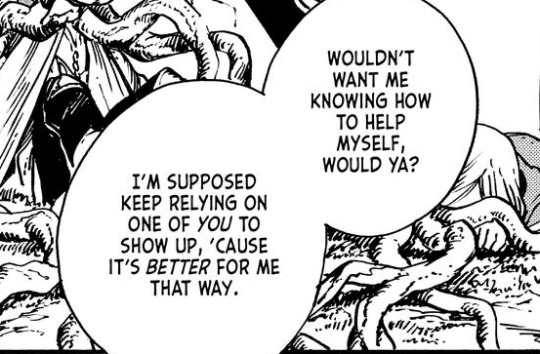
To me, the point was supposed to be: the system in place doesn't work, which results in people in need not getting help. We loop back to the accessibility I started off mentioning. Yes, before the current system, bad things happened - but the current system is still allowing other bad things to happen now. So...why is Coco pushing Custas to join the pointed hats and abandon the faction he sided with? If a character who was upholding the status quo was doing so it would make sense (like Beldaruit) but Coco as a main character exists partially to point out why the pointed hats are not good. She demonstrates it to the reader via what happens to her AND knows it as a character. It comes off as inconsistent and frankly makes little sense.
Speaking of inconsistencies...why does Lulucy not recognize Custas, a child she's known for a while? Why does the young prince, introduced as a suspicious character on behalf of his family's unknown goals, become a helpful selfless little guy? Why are the Knights, originally introduced as an antagonistic faction because they are a milita enforcing the status quo, suddenly portrayed as fighting for good as a bunch of remarkable individuals?
Ah yes, the cops. I'm going to address something really fast about them. It makes me frankly uncomfortable the author chose their faction to evoke the two very sensitive topics of sexual assault and homophobia. I think the way those topics themselves were handled without greater context was surprisingly good, and it's touching in the first place to see an author who not only cares, but uses her series, destined partially for younger readers, to explain why she cares. However, Witch Hat is a very black and white series: the bad guys are bad and ugly and you should dislike them, the good guys are good and you should like them. There are some exceptions but who have been losing steam as of late. While originally introduced as a group of individuals who act in problematic ways for their day job, the Knights have slowly lost that bad guy flavor to become a fun band of colleagues/friends. They are law enforcers who enforce unjust laws, but it seems that the author's not on board with people hating them because this is the second time she gave a Knight a tragic backstory that makes them more sympathetic to the reader. First of: I do not see what's to redeem about them if the story's about changing an unjust system, so I don't get the necessity to make them nicer. Secondly: at least in my country (which has legal gay marriage and notably less sexist than Japan) law enforcement is renowned to not help sexual assault victims or gay people. The Knights Moralis are fantasy cops and cops, in real life, tend to abandon people who need their help regarding those two issues - if not worsen them, and count a majority of sexists/homophobes among their ranks. Making your unsubtly cop stand-in faction have both characters with those issues comes off as at least a poor decision if not bad taste.

(big words from the guys introduced in the story by arresting a bunch of children who were on a rescue mission for a misunderstanding they would not have cared about. Die idgaf)
Some more surface level things:
The art. The first books of WHA are noticeably more complex in their style featuring more reaslistic proportions for the characters. Latest arc has seen art lose some of the decorative "classic" flair in the linework and characters looking simpler and stylized to look way...Younger? In a way I do not like. Yes, it's expected for manga series to see their style evolve. I also want to make this clear: I consider the pace imposed on manga artists to be inhumane and if Shirahama had decided to draw her manga as stick figures to work less I'd be down for it.
The dialog. While WHA is very in your face (you may call it preachy) the dialog in the latest chapters especially Coco's feels off. A 12yo wouldn't give off speeches about the world in the heat of battle. When it's a calm scene between two characters discussing a deep thing, sure. When it's an epic public adult figure (see: Dean), sure. I'd prefer having the kids talk like kids.
Goddamn the story has become less nuanced and subtle over the time. Scenes like Qifrey getting confronted by Tartah post mindwiping his grandpa owned. The story's current "morally grey" moments just don't do it for me anymore. No, I don't want the witch politicians of the faction you established as a mistake beforehand to continue. I don't care if the fantasy cops are offended by a grieving husband pointing out they suck. I kinda wish he'd thrown hands actually
So...yeah, that's about it. While WHA's plot beats has always been impossible for me to predict, I don't know if I can trust where the story is going anymore. The fans eating it up confuse me and I might even get hate for posting this. Truth is, while some aspects have always been more or less present in the series since the start, I've felt like the really good bits that balanced it out have been going extinct. I don't know why and it's none of my business to. Some friends have pointed out we might be reaching a point where the author ran out of pre-written story and is now improvising. What's a bit concerning to me is I've also noticed she's way less active on social media, where she used to post regular bonus material for the series, this has stopped and I hope it's not because she lost her interest for the series or way worst, is overworked. Given the conditions for mangaka it wouldn't be impossible and like previously stated, I am of the opinion that no comic book series is worth putting their author's life, health and free time down. It's more important than me disliking the comic.
And regarding Custas - him joining the atelier to study with Qifrey would not be a good ending, no matter what the fandom says. It won't be cute found family. Custas has a family who's unique member wouldn't be able to follow him as a witch. That ending would separate a very traumatized child from the only adult he has in his life that gives him unconditional love and support. Custas needs to not be seen as a criminal so the rest of his life won't be over, and also a whole bunch of cash.
I'm not excited for the anime.
117 notes
·
View notes
Note
is it bad that as much as i like your ocs (theyre amazing, i love them!), i really miss seeing you write for the canon characters
You know, that’s valid. The proportion of Canon and OC content here lately has been way off. It’s sort of the elephant in the room I ignore every time I think about Obey Me and my inspiration automatically focuses on the world building or OC potential instead.
There’s a few reasons why I’ve been less interested in writing canon lately.
1. Disappointment with Nightbringer. I’ll be honest, I’m not sure why this game exists (except to overhaul the franchise’s monetization structure). The premise and lore payoff hasn’t been that great for me personally - it feels more like an AU rather than a canon addition/continuation of the OG game. It feels like we still end up with more loose ends and questions that we don’t have (and may never get) answers for. I’m still waiting for Raphael and Mephisto to be dateable, by the way. As a result, my focus when writing OM content has been using the OG story/characterization using the odd piece from NB that makes sense, and that leads into…
2. My favourite parts of Obey Me are under-developed in canon. I enjoy most of the canon cast, I really do. But I want more Celestial Realm lore, I want more Michael (and not NB HM Lesson 20 Michael), I want more angels in general. They’ve mentioned Uriel a couple times now, give me that angel please and thank you! (No longer relevant, I wrote a version of him myself.)
The world feels so empty at times but there’s so much potential. Parts of the Devildom are more fleshed out with NB adding to it, but what about the other realms? What’s going on with the Sorcerer’s Society and the reapers? I never know if the interesting hints of lore we get are truly relevant or if it’s just something the game decided was convenient for a plot point and never gets mentioned again. NB has been great for Solomon fans since it’s practically a Solomon x MC fanfic written with a forced roommates trope, and that might be the best thing about it from a lore perspective.
My OCs were originally meant to explore gaps in the world and give the canon characters room to grow beyond the one or two defining traits the game keeps repeating over and over. I like writing Mammon when I can have him interact with Karasu, I like imagining the types of angels other exchange students might meet in the Celestial Realm, I like giving a name and personality to the mysterious owner of The Fall where so many events and Devilgram stories take place. Admittedly, it was refreshing to see that other people enjoyed reading about them or imagining them paired with their own MCs/OCs too. I call them the OC Fan Club with genuine affection.
3. It’s not something I talk about often but before I began writing fanfiction, I was mostly focused on concepts or outlines for original stories. Writing supernatural and horror themes always been my interest as a writer so anything with demons/angels/other monstrous races automatically catches my eye.
It’s a little mean to say, but half-baked worlds like the Devildom are a lot of fun to use as a foundation for expanding my own ideas. The OC story I’ve been working on is one way for me to write longer and more complex pieces which is the type I like most. Granted, it includes nearly the entire game cast and it explores the Devildom and Celestial Realm in ways that tie together some of my favourite personal headcanons and characterization. It focuses on angel characters and the history/culture of the Celestial Realm which are two of my main interests for this game. It’s a huge project - the outline is nearly 20k words on its own, it’s practically a novel divided into four sections with 30+ chapters and an epilogue. I can’t even express how excited I am when I get to work on this.
That being said, I do like writing canon content and I’ve been missing it more lately. I got burnt out when it felt like I was losing interest in NB and was pushing myself to keep writing anyway which isn’t great.
Today someone left a nice comment on something I wrote a while back, an angst piece for the demon brothers. I haven’t read it in a while and after going back and re-reading it, I was like, “Huh, I don’t remember liking this as much as I do.” And then I remembered something in my drafts that’s been rotting away, half-edited and ignored, and realized that I wanted to finish it. So, I’ve been slowly tinkering with things while I work on my angels’ story. Some of my plans are ambitious and real life distractions (mostly health related, like my recent bout of COVID) haven’t helped.
If I learned anything about my writing since starting this blog, it’s that:
writing what you’re passionate about is more fulfilling than writing what seems trendy or popular
giving and receiving feedback and fostering friendships/supporting each other keeps the community thriving
self care self care self care
Anyway. My goal has always been to write about the things I love about the game world and the things I create that are inspired by it. It’s a delicate balancing act that I’m still working on.
#jes.replies#hilariously bad takes abound#somewhat personal?#also I’ve been working on an oc side blog to try and organize things better#this may or may not get deleted if delayed embarrassment kicks in tomorrow
29 notes
·
View notes
Text
The shadow presence of adults an family in Utena
Currently I try to clear up some convoluted ideas about childhood innocence to agency through social indoctrination depicted in Utena.
Obviously the most present indoctrination happens by Akio's hands, and his extension the form of the panoptic, omnipresent, ever-acting system of Ohtori academy.
But I did catch myself by the mistake to assume every child/teenage character in Utena is solely influenced by Akio. In fact sometimes adults do appear sparsely throughout the show, and it's always relevant. Like the guidance counselor as signal for the reinforcement of social rules, or Tokiko contrasting Akio.
The characters enter the school already with knowledge of fairy tale structure (Wakaba's mother telling her tales of the Onion prince), Miki disdains his sister on sexist premises way before he's manipulated into dueling, Nanami already used violence on others to secure Touga's attention before she entered school. It can be argued that the world outside the school ground, the city we see in the background is an extension of Ohotori too. Thinking then how parents already primed their children already when they arrive at Ohtori, and how important the death of Utena's parents is to her, I do think the families of the characters are much more relevant to than the visual narrative of obscuring their faces lets on.
...or: I found a niche, and now I have wild theories. (This is definitely a very speculative post, my mind went on a slippery slope of theories.)
Content warning for discussions and mentions of: Child abuse, death, manipulation, grooming, sexism in general.
I. Why do we barely see the face of so many adults? (If I claim that they're relevant?)
First, Utena is, among many other themes, a story about maturing and leaving behind a lot of rules and ideals that hold people back from becoming a person. Most characters are aged from early to late teens. Highly relevant to the themes of Utena, this is a period of self discovery, detachment from previously installed beliefs, and discovering the possibilities of the the world. Although the latter points are halted by Ohotori and Akio.
In that way it makes sense that the characters think more about themselves as independent with parents more on the sidelines.
Further, only very few characters realize fully that they're part of a cyclical system, and are unknowingly but actively hindered to come to that realization. In that sense, it's not far off that they would blend out elements they themselves not consider relevant.
Meaning, they wouldn't realize how formative their previous family life is to them but they get a new, aspirational role model of another adult.
Second, Ohtori as place with it's own logic runs by Akio's narrative. He's the one who chooses important characters, sets up important rituals with Anthy's help, and manipulates them to take on a certain journey - if they want to take it or not.
For Akio it is vital that he imposes himself as the most present most visible adult in the life of Ohtori students. (Note: Either himself or Ohtori as systematic extension of his.) He wants to be the aspiration so everyone emulates the rules and behaviors he wants people to emulate.
The only other adult with more screentime, clear personality, and visible face is Tokiko who is many ways Akio's counterpart. Although she,sadly, never interacts with any students at Ohtori during her visit.
Side note: Akio often avoids being seen the direct instigator of events. Either Ohtori staff, social rules, and social life reinforce his ruling, her he manipulated others so much they act by his playbook.
It also leaves his image untarnished.
Touga is Akio's proxy on campus. Groomed to imitate Akio, Touga taunts others, especially men to imitate the idealized image of manhood. Close to graduation age, already using a lot of signifiers of grown up masculinity such as promiscuity, using a motocycle (but with a helmet) as approximation to a car, Touga is the entry level to emulation although Akio has the last word on how a person should finally act.
II. Other visible adults
a) Campus staff
The only few adults with a face are campus staff. Namely the guidance counselor, her male colleague, and the music teacher. The former two exist to enforce Campus rules on the students. Either responsibilities for school prestige, or the dresscode. (The music teacher is a bit of an outlier at he's more of a point to Miki's and Kozue's contrast, Miki being allowed innocence whereas Kozue is not receiving any protection, but I would note that he abuses his position of trust for attempts to abuse Miki.)
In every case it's save to say that they're all roped into Akio's direction.
b) Chida Tokiko
Boy, I love Tokiko. In her short presence she carries the entire weight of the meaning of the Black Rose arc. She's also in juxtaposition to Akio. Also, she pretty.
Alright, first who is Tokiko? Tokiko was Chida Mamiya's big sister who lead an entire research project at Ohtori Academy to save her little brother's life. She came in with abstract ideals to simply keep things in a never ending stage (stressed by her disliking to see flowers wilt) which Nemuro rightfully calls out as perpetual motions machine. In spite of her best interests, her project was hijacked and used by Akio to install a duel occasion for 100 male duelists. Her project ended in tragedy. Mamiya died anyway, over his anger Nemuro killed 100 students. Directly or indirectly, Tokiko being roped in with Akio's ideals did lead to high count of human loss, and her ideals failing anyway.
Unlike Akio, Tokiko left Ohtori though. She visibly is marked by the events, has regrets, and misses her brother. On the occasion to visit his grave, she does return to Ohtori. However, with all regrets and sadness, Tokiko faced the tragedy and moved on. By seeing Nemuro, now Mikage, Tokiko comes to absolute certainty that eternity means a lack of progress for everyone.
Given the fact that Tokiko could face a great deal of loss and tragedy, partly by her responsibility but still decides to leave and not to stay Ohtori, she is very much in contrast to Akio. Akio can't face his loss of ideal and "innocence". In fact he never reflects upon himself but artificially hinders everyone on campus to progress as people. Nemuro even gets punished by having his memories conversed to heterosexual interest towards Tokiko, in order to fit into Ohtori's narrative.
Tokiko who has gained maturity, and accepted her loss is the kind of adult Akio should be but can't be because he clings on childish ideas which in practice keep everyone locked in misery. If the students ever interacted with a different example of an adult, they might not find a fancy role model but one which is far wiser than Akio. It's sad that the only alternative to adulthood never gets to interact with any of the students (even though that's kinda the point). The one who would have needed to speak to her the most to deconstruct is self-delusion and accept loss, doesn't recognize her anymore.
Side note: Mikage is the student interacting with most adults. In the past it was Tokiko.
In the present there're adults around him due to his academic importance, officials who ask for academic support, or his secretary. But notably we never see their faces, only hear their voices. All these faceless adults speak negatively about him, and ignoring the fact that in spite of his intellectual brilliance, and introverted nature, he's still very much a teenager who does have the inner life of a teenager.
Considering that Mikage can't move on from his state of teenagehood, I speculate that Mikage doesn't pay attention to the age group, state even?, he can't become.
Mikage doesn't even recognize Tokiko anymore.
III. Relevant family lives
So I mentioned in the introduction how the parents already send their children to school with preconceptions of social rules and dynamic. Some characters like Juri don't mention parents but siblings. I do think they're also relevant in the way the characters are able to understand affection.
Families are not the only but still a highly relevant structure within children pick up on life philosophies, social rules, and especially expressions of affection.
a) Utena's dead parents
I'd seen some speculations going around who Utena's parents might be but I don't think parentage is relevant. Thematically Utena is about liberation of harmful systems as well as modes of thinking. In Penguindrum, Ikuhara explores how certain families can shape us in much deeper manner. In Utena systematic imprints are much more abstract. That sounds a bit contradictory, so let me rephrase it: It doesn't matter who exactly Utena's parents are, however the fact that they're dead is highly relevant to her.
The manga does reference Utena growing up at an aunt but more or less Utena is orphaned at an young age. This leads her to have idealized ideas of family, leaving her with a lack of experience to judge boundaries.
By example, Utena might not like Touga but she misreads his acts of heroism, akin to her prince-ideals, as affection of an older brother. Or she's not weirded out by Akio accelerating their relationship from "friend of my little sister" to "you are like family".
In general, Utena's lack of familial experience leaves her with a lack of knowledge what different forms of affection look like.
Granted, Utena is 14 years old, and not the most senstive person still I noticed how often Utena is unable to formulate her exact feelings towards others. The friendship with Wakaba because in Utena's clear cut mindset girls who are close are friends (as Ohtori doesn't an offer another model how women could be close to each other) even though Wakaba having an earnest crush on Utena isn't unlikely. Apart from the fact that Ohtori is a forcibly hetero normative place, Utena is extremely confused by her feelings for Akio and Touga, but also for Anthy. She's getting manipulated to play act romance with these two men.
But she also can't read others very well. At first she doesn't realize the animosity between the Karou twins, she doesn't take Nanami's outright rage towards her seriously until Nanami's duell goes overboard, she misreads the "friendship" between Juri and Shiori.
Utena's only guidance in life is the prince ideal. For one it is the closest Utena has a model for agency but also as model for being loved and admired. Utena is entirely on her own to evaluate relationships.
b) The Kaoru divorce
The Karou twins are in my eyes an easing introduction in themes of misogynistic treatment, and perversion of male-female dynamics leading to incest, but they're also the youngest in the cast. (Except Tsuwabuki, of course.)
First we assume that their estrangement stems from Miki slutshaming Kozue, which is definitely at play but their estranged familial connection has another source. We only learn very late about the Karou parents getting separated, leaving their children behind. Both children are lost, symbolized by building up a birdbox for abandoned bird babies. Their family is falling apart. They need each other more than ever but have so much difficulty communicating with each other.
Ohtori as a place reinforces the idea of a girls scoial inferiority, everyhting a girl does is getting evaluated and judged, it drives the wedge between Miki and Kozue even further. However, the twins learnt a gendered perspective by their parents.
In the flashback of the the piano recital, Miki's allowed to rest and stay away from the recital. Kozue was unwell, crying, anxious, desperate to not play but her wellbeing is disregarded.
During their parents separation the cause is father Kaoru leaving his family for another woman on his own beheast. The twins don't blame their own mother but approach their father differently. Both are angry at the adults in their life, Miki even states that his life is dictated by adults. Kozue absolutely disregards their father's letter.
But Miki, praised for his maturity, states way too understanding phrases to his father on the phone. Miki also projects on idolized Anthy on his soon-to-be-stepmother. Who wouldn't leave everything behind for the ideal woman, in Miki's logic? Miki can only be this "mature" (actually, asked to not cause an authority figure any trouble) by trying to rationalize why he shouldn't be angry at his father.
c) Juri's nameless sister
Even later than the Kaoru twin's family situation, we learn only in the final episode about Juri having a sister.
In Juri's story, the sister almost drowned but a boy tries to save her, only to drown himself. For all heroism, Juri forgot his name.
Later in Adolescence we learn that Juri was actually the one drowning, and Touga drowned for her sake.
That might leave the existence of Juri's sister in a speculative realm. If we were to take it seriously, I would have some theories what the existence of a sister would mean to Juri.
A sister is a very close relative. In this proximity Touga's death would still be close enough to Juri's experience but not close enough to herself. It's highly speculative if this falsification of memory is artificially altered by Akio to have Touga walking around not be suspicious, or, which I consider more likely, it's Juri's response to distance herself from the guilt for Touga's death. It wasn't her fault he died but she was the motivation behind his passing. Forgetting his name, having another person between herself and Touga could distance Juri from the tragedy.
With Utena I noted, how Utena with the lack of any previous close conenction is unable to recognize, even less so name the nature of relationships she has. If Juri's sister exist that would mean that Juri is familiar with a close relationship to another woman which is not her mother. In that sense, she would know how a familial closeness feels like, and not name it by the next best thing.
Therefore, she's able, unlike Utena, to recognize exactly that her affection for Shiori is of romantic nature.
d) Does Saionji have a family?
The text mentions nothing of that sort, everything else would be pure speculation. From Saionji's memories his biggest issue in childhood was the growing distance to Touga, and the worries about the little girl in the coffin (oh boy, did Ohtori lead you down the wrong path...) otherwise nothing else of note.
For one reason or another, Saionji can't go anywhere after getting expelled. Why he can't return to a home is up for speculation. His parents kicked him out? He's too ashamed? He has no parents? Any guess is as good as mine.
But considering that Saionji mentions no formative character in his life, no parents no siblings, I am led to believe that the lack of reference is for Saionji, like Utena a cause for him to have trouble to keep his distance from proximity being baited to him. Since his only relationship in his past seems to have been Touga, the only reference of connection is friendship. What once might have been healthy is an idea Touga taunts and uses against Saionji.
e) Did you hear about the Kiryuu's?
Oh boy, this house is a nest of snakes. It's only in Adolescence we get a full picture of all the abuse that went down in this household but the impressions we get in the show are already horrific enough.
We learn that Touga and Nanami, related by blood siblings, got adopted into the family. Nanami is too young to remember, however that feeling that subconcious knowledge of not fititng right in seems to linger in the back of Nanami's mind: Nanami is in constant fear of ostracization, she projects all that of performing to peak social performance, by looks, by reinforcing social status by putting up schemes to sabotage others or literally beat others into submission, dressing in praised brand fashion, and making very clear that she's in no way like that shunned weirdo Anthy. She could never be that weird, laying eggs is totally normal, right?!
In the instance Nanami does remember her parents, she remembers being shamed for being inadequate, especially by being genuinely herself gifting a kitten to Touga. She's also constantly alone, except for Touga.
In an environment where Nanami is demanded to always correspond to the norm, facing scrutiny, letting her grow up isolated, it makes a lot of sense why Nanami would attach herself to the only person showing her kindness, her older brother.
Nanami's only model of reference to to and being loved is a sibling dynamic, hence her fixation on Touga. It also means, Nanami wouldn't know any other model of affection except for this one, actually.
Paired with her constant need to be the heart of the masses to proove total adaptation, Nanami can't let anyone get close to her because of her singular outstanding status, and she wouldn't also know how.
Any concern of Utena about her, Tsuwabuki expressing in child-typical honesty that he wants to be close to her, are either met with anger or used for her own gain (something she probably picked up from Touga, too).
Touga's place in the family is the most brutal. He was sold by his birth parents for the explicit purpose to be abused. The fact that we do see see the adoptive's father's face in Adolescence leads me to theorize about Touga having a too clear, unshakable memory from his childhood trauma.
(Sidenote: Hair in relation to emotional state is sometimes brought up with characters, long flowing hair standing for a person being free of restraint. In memories about Touga by people who idealize him, namely other boys like Miki, Tsuwabuki, and especially homeboy Saionji, touga has long hair. But Nanami who has less cheerful childhood memories remembers her brother with short hair. In his own memories Touga remembers himself having shoulder length hair because his adoptive father demanded him growing longer hair. Nanami and Touga's way less idealized recollections are much closer to the truth.)
Touga's childhood was entirely shattered, and severed so many genuine bonds of those who loved him. It's very difficult to not not feel sympathy for Touga even at his worst sabotaging his relationships because at a very young age, what should've been the safest relationship, a caring family, has been utterly destroyed for him. To say, him being disillusioned and distrusting of proclamations of honesty is comprehensible.
(Since this post branched off on thoughts I had on gaining agency within a indoctrinating system, Tougs acting fully concious whereas also blind towards his motivations is a point I can't help talking about again and again.)
Touga is a very central figure in luring in other students into the idea of princehood, while also getting lost in it, so understanding why he adheres to a system that promises power of everyone else is highly relevant understanding why the system is so successful at perpetuating itself in it's own confines.
In conclusion: For both siblings, their parents were a big source of trauma. If not the formative trauma to prime the kids ideally for Ohtori's pathway into doom.
Nanami is so afraid of being other-ed that she would do anything to be part of the crowd. On the flipside by fully adapting to it she's deeply afraid to question conventions, highlighted by the Cowbell of Happiness.
Touga is so scared and angry for having been used, he would always try to control others so none can control him, he sees no way out of his misery.
f) Throwawaylines in the Himemiya household - non-relevant observation
Probably not too relevant to the actual dynamic between Anthy and Akio, but there's this one line Anthy drops and never picks up again. it does drive me slightly insane. Anthy mentions that Akio does remind her of their father. Nothing conclusive of their obscure family life but I have speculated before how Dios died for an ideal externally imposed on him.
This is not a relevant point at all, it's not even a point. But I wanted to bring that up because having no better reference for an alternative way would explain a lot with Anthy and Akio.
g) The Ohtori family
So far we did have two terrible fathers, why not go with a terrible mother then? Alright, in the case of the Kiryuus', the mother is implied to be part of Nanami's trauma, Kanae's engagement is arranged by both parents. Only Mrs. Ohotori is the only present parent in the sense we see a vague figure, and a cut-off face.
For a supposefdly prestigeous school the family supposedly run, it's also clear how under their name, terrible social practice part of the life at the school. They themselves arrange a marriage for their daughter right after their graduation. And Mrs. Ohtori sleep's with her daughter's fiancée. I feel inclined to not protect Mrs. Ohtori to get involved with Akio. Akio chooses his victims to be in many ways weaker than him. He chooses underage girls, namely neither Anthy not Utena have a family or any other social safety net. And Kanae's parents obviously wholeheartedly agree of her engagement with Akio, so Kanae can't voice doubts. (Or she's told to project on Anthy instead...)
Further, Akio adopts his fiancée's last name as an indicator that marrying Kanae is him rising in social status, not her. His fancy apartment, the big telescope, all belongs to the Ohtori's. Akio's seduction is only sexual, he can't exploit Mrs. Ohtori on the base of less experience and power like the did to the girls he usually abuses. No big point here but to highlight how corrupted the adults running the central institution are.
Sort of a conclusion: Probably I spend more times and thoughts on this than needed. But I did spend a lot of time thinking about Tokiko and Kaoru twin's motives of leaving childhood and differing personhood by gender, sending me in onto further thoughts how the presence and also the lack of adults in the life of many students is relevant for understanding their motivation. Why would they have certain outlooks on relationships?
Some parentages and familial are more nebulous, less relevant than others, too, although for some characters like Touga, the twins, or Utena, the relationship to their families mark the starting point of their journey.
61 notes
·
View notes
Note
hi! I saw you mention in one of your posts that canon sukuna gives off aroace vibes, I'd love to hear more of your thoughts about it if you want to share because I totally see it
Stereotypical shounen manga tends not to delve into love as a topic. Usually some background characters are shown to be in relationships, usually marriages and it’s not expanded upon, in JJK there’s just one such couple, Hakari and Kirara, it’s very clear they are a couple from how they are drawn together but it’s never mentioned in any way. And sometimes the main characters have some kind of love interest, then it’s either played for laughs or it’s usually extremely immature, even in such manga as Full Metal Alchemist that is praised for a lot of stuff, the romantic angle between Ed and Winry makes my teeth hurt. And of course there’s the famous trope of the main characters marrying some background girls who had no or little relevance to the plot, in the “and they were all straight” epilogue.
I say that Sukuna has an aroace vibe because canon Sukuna has no interest in love or sex. And this consistent lack of interest is actually part of his arc.
There’ve already been 3 characters who wanted to teach him about love and he did everything not to engage with them on that premise. He very openly told them and showed them that he considers stupid the concept of love they are trying to teach him. Granted all 3 of them were very selfish people, and actually never considered Sukuna’s emotional needs, they just projected their own feelings onto him and tried to get validation and reciprocation. So maybe if someone approached him with a less selfish form of love he’d’ve shown some interest in it, but probably not.
He’s also not interested in sex. I don’t know how horny Gojou was for him, granted Gojou has never seen the true form and when they fought Sukuna was wearing Megumi’s face, which reminds Gojou of his unprocessed trauma of almost getting killed by Touji. But Yorozu and Kashimo were clearly down to fuck. And Yorozu actually shows that Sukuna’s always had groupies so if he wanted to fuck he could’ve quite easily.
That all being said Sukuna is actually clearly capable of having close relationships, he has one with Uraume. In their interactions he’s always mindful of their feelings. He reassures them in Shibuya, acknowledges their hard work once he jumps to Megumi and shares mean girls moments with them. They seem to be really close in a pretty cute way for two homicidal cannibals, he just isn’t interested in romance and so on.
#answering asks#slowly#because damn nothing in my life is good right now#sorry it's taking so long#thank you for the ask#also this reply is about canon#if people want to ship him then ship him#i ship him#canon is for meta#shipping is for fun#jjk#jujutsu kaisen#sukuna
29 notes
·
View notes
Text
it’s so fucking weird to me that this person is so far up helio’s ass that they’re actively refusing to see the crux of the problem ally/kristen took with him. kristen asked helio - the god that she’s worshipped her entire life, who she was chosen for - why people experience suffering in the world to such a high degree. she was met with straight up deflection.
Indeed, person who blocked me, Helio deflected the question, but that doesn't change the fact that 90% of everything both Kristen and the fandom says about Helio being bad forever after is "frat boy". Furthermore, while Kristen is within her rights to have found that disagreeable, it's not actually that weird that a god would pass on explaining the massively complex subject of the Problem of Pain to a teenager in the remaining five seconds they had before she was revived.
Again, Kristen could prefer doubt. I have a close friend who converted to Judaism for basically the exact same reason, because Judaism in her experience encourages questions more than being raised Christian did. It's valid. But both Kristen and the fandom treat doubt as the only valid expression of spirituality, and act like having faith in anything is inherently bad. That's why I enjoyed Tracker smacking Kristen down so hard when she openly accused her of selling out with Wolfsong, and yet half the fandom is still convinced they're secretly evil, or at all relevant to the plot for that matter. For the fandom it must be sinister because it's not Kristen's special reverse-faith.
But if you are a member of a religion that works on faith, which is like, most real world religions, 'not knowing' and having like, faith that a deity or deities is doing something or has a specific plan or way of doing things even if you don't know all the details is pretty important! So it's weird that just because that's not for Kristen that the fandom blows up into it all being terrible, just in and of itself, for anyone.
#that’s not even mentioning the real-world parallels to be drawn between the church of helio and fundamentalist christianity
I'm super mentioning that. Because, like, there are other versions of Christianity. Daybreak went to Hell! He went to Hell. Helio is not the fundamentalist stereotype of Christian God. He is clearly presented as not being someone whom people like the Harvestmen accurately represent. But the parallels to fundamentalist Christianity have been taken by the fandom to mean that's all there is, and that Buddy must necessarily abandon his religion and switch to Cassandra or Ankarna - ANKARNA, the infernal god of rage and conquest who has directly caused the deaths of several people including Buddy's - to be a good person.
And everyone is like "Helio let this happen" like yeah Cassandra let a lot of things happen, gods in D&D worlds don't micromanage every crisis, they don't magically shield every follower from being betrayed by their teammates. It's one of many issues caused by forcing a version of fundamentalist Christianity into an otherwise D&D-based cosmology, the Problem of Pain in general works differently because there isn't a single omnipotent god which that whole premise is meant to challenge. No one asked Zeus or Thor why there was suffering in the world, it's only a problem because the god being asked the question is supposedly omnipotent. Helio did not let it happen, it just happened and it doesn't make sense to treat the situation as having been entirely in his control as though that's expected of any other god. But Helioism is a stand-in for Christianity and that is just fundamentally incompatible with D&D divinity, so Sol and Helio are treated so differently is completely inexplicable.
29 notes
·
View notes
Text
That fic i mentioned, where Xie Lian is doing Yin Yu's work, is done!
The premise is: Xie Lian escapes Fang Xin Guoshi's coffin and becomes Hua Chengzhu's right hand, while still wearing his mask.
Also, Xie Lian can hear the prayers of some guy named San Lang. I'm sure it's not relevant to the plot and won't come up later.
Hope you'll enjoy it!
@tumblerislovetumblerislife @gxlexii @thedevilundercover
(I hope I'm doing the tagging in the right place, I live under a rock and don't know tumblr etiquette)
#mo xiang tong xiu#xie lian#mxtx tgcf#hua cheng#hualian#tgcf#heaven officials blessing#hualian fanfic#mxtx#heavens official blessing#heaven official's blessing
45 notes
·
View notes
Text
So I recently played a decent chunk of Snoot Game because of how many people I saw who claimed it's the best VN ever and the fact it was made by 4channers to spite Goodbye Volcano High for having fair working conditions and queer representation totally doesn't taint it at all. I can confirm that those caveats definitely taint the game A LOT more than those fans make it sound. It's a good game if you're a teenager who thinks Family Guy is funny and has never played a VN that wasn't a boring slice of life dating sim where the goal is to click the right dialogue to get the sexy CGs with the hottest waifu. However, if you have any criteria for tastes higher than that bar, you probably won't enjoy it.
The entire game exists purely to be able to say it's possible to make a good VN in one and a half years without doing a bunch of delays, but Snoot Game is a straightforward VN made in the easy to use Ren'Py engine while GVH is being developed in the much more complicated Unity engine as a pseudo-VN/rhythm/adventure game with a large branching storyline. It's really not comparable. Even so, it's just a weak point to criticize a game for taking a long time to come out. Delays are frustrating in the moment, but once a game is released, it usually ceases to be relevant. On top of that, the point is kinda negated by the mere fact Snoot Game is bad. The early parts are downright repulsive and it only starts to become tolerable around the point most decent players just adapt to its shittiness.
On top of that, even from what we know about GVH, it's clear its story is more ambitious overall. GVH is about a group of high school students going to school while knowing a meteor is coming that will kill them all. Adults are making them go along like nothing is wrong while the central cast use the opportunity to grow up in the ways they wouldn't really get the chance to if they had any futures to think about. It's a really great premise with a lot of promise.
But Snoot Game? A human goes to a high school of dinosaurs and falls in love with a classmate. The twist? The human is a 4channer and his love interest is a non-binary "girl" who he tries to convince to detransition for him and if they don't, they become a homeless drug addict or a school shooter. And in case you are wondering, you can donate to the development team using Crypto. Oh and the meteor from GVH just doesn't factor into the story. Granted I haven't played through all of it, but even if it does factor in, the fact it doesn't come up at all for as long as I was playing is a seriously bad indictment of the game that it thinks its most promising narrative device should be taking a backseat to the teacher who looks like that fat dude from Aqua Teen Hunger Force (did I mention this game is extremely unfunny?)
And even for a Ren'Py VN, there's just a lot of better games to play, especially furry VNs. There's Adastra, Echo, Arches, Remember the Flowers, Burrows, the Smoke Room, and Where the Demon Lurks to only name those I've played. I legitimately do not see a single reason why one would enjoy Snoot Game unless they are queerphobic, hate the idea of game developers having good working conditions (because GVH is made by a workers' co-op), or have their sense of humor completely ruined by 4chan, especially for enjoying Snoot Game over the many other far better furry VNs out there. If you're a veteran of furry VNs and want to know how bad Snoot Game is, it's like every single pet peeve about furry VNs stuffed into one game with all of the most obnoxious bigoted jokes and outdated pop culture references caked into it that doesn't even have any furry hunks to thirst over, unless you're really into scrawny scaly dudes drawn in MS Paint
122 notes
·
View notes